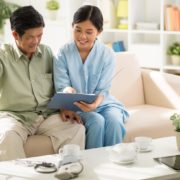As older individuals are considered at higher risk for the novel coronavirus, the Centers for Disease Control and Prevention (CDC) has advised them to stay at home and limit contact with others.
Studies have shown that people 60 and older and those with severe chronic health conditions — such as heart disease, lung disease and diabetes — are the most vulnerable as COVID-19 continues to spread.
With the social distancing measures in place, it can also heighten the isolation and loneliness that become more common with older age.
“There’s evidence that’s already emerged that COVID-19 can affect our psychological wellbeing. People who are more at risk of contracting COVID-19, including people with chronic illnesses, reported higher levels of depression and stress levels,” said Dr. Erwin Tan, director of Thought Leadership-Health at the American Association of Retired Persons (AARP) during a recent press briefing.
In the Filipino community, 1 in 3 older adults are affected by social isolation, according to Dr. Paolo Narciso, vice president of impact areas for the AARP Foundation.
The group found that social isolation costs Medicare an additional 7 billion dollars every single year.
Here are some ways to support older adults in the community during the uncertainty of this pandemic:
Check in and stay connected
Family and friends can reach out and maintain that social connection, especially for older adults who live alone. This can be through texts or regularly scheduled phone calls and video conferences. Experts say this will allow older adults feel more comfortable with seeking help if they need access to food, medicine and other supplies.
AARP has also established Community Connections, a new website that offers steps to find help or give it during the pandemic. Mutual aid can include picking up groceries, providing financial assistance, or lending emotional support to your neighbors.
“While we may be physically isolated because of the virus, we don’t actually have to feel lonely or alone. Social distancing doesn’t have to mean social disconnecting. While maintaining physical distance is important, we can’t risk having more people to be emotionally disconnected. Emotional support helps us to see through a lot of these particular tough times,” Narciso said.
Access to mental health services
With the COVID-19 pandemic, individuals around the world are feeling increased anxiety, stress and sadness, which can lead to shifts in sleeping patterns and other physical symptoms.
Social isolation and loneliness are also considered serious health issues and can affect mental health. “Some Asian Americans have difficulty accessing mental health services in part because of negative stigmas. One way I try to talk about it is that taking care of your own emotional health during the COVID-19 pandemic will help you plan clearly and protect your family,” Tan said.
One way to seek help is through Medicare’s telehealth services, which covers mental health counseling, or check if other private insurance plans cover therapy as well.
There are other helplines that provide free and confidential support and crisis resources, such as the SAMHSA National Helpline (1-800-662-4357) or the National Institute of Mental Health Crisis text hotline which connects individuals with a crisis counselor if they text “HELLO” to 741741.
Watch out for and report scams
Individuals are encouraged to only seek information and news from trusted sources, such as the CDC, the World Health Organization, their local public health department, or AARP’s website. Since the outbreak, information on websites sharing fake cures or fake testing sites have falsely been disseminated.
As with any major crisis, this is the time when scammers are targeting vulnerable communities, including those 50 and older. One of the more recent schemes out there is fraudsters asking older individuals for their $1,200 payment from the federal government as those who receive Supplemental Security Income were also eligible for stimulus relief.
“We know that scammers are running a number of schemes like COVID-19 charity scams or fake vaccines claiming to cure you of the coronavirus. AARP is sounding the alarm about coronavirus scams, whether it is through the AARP Fraud Watch Network or through local authorities. If you spot a scam, you can stop a scam. So please encourage our community to speak up about fraud to the Federal Trade Commission,” said Grace Calvelo-Rustia, associate state director for AARP Pennsylvania.
AARP has a helpline — 877-908-3360 — for those who suspect a scam.







